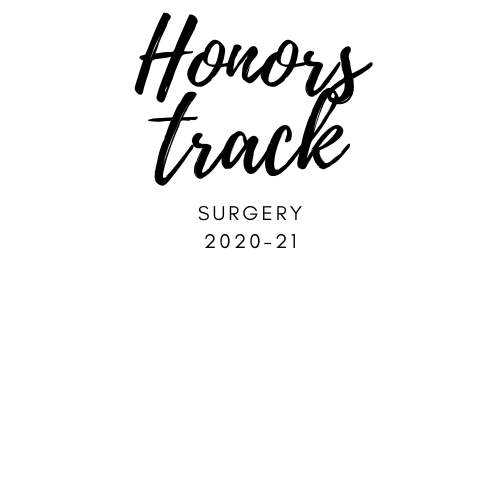
HONORS TRACK IN SURGERY
Purpose and objectives
Knowledge acquired during the Honors Track in Surgery (HTS) is essential to reach an overview of surgical practice, understand the differences among surgical specialties, and to have a solid basis as resident in any surgical specialty. The course should help the students to understand their aptitude for surgical practice and the main field of interest among different surgical specialties. Organization The track will be organized as follows:
1. Intensive period one: 2 weeks during the summer of the fourth year
2. One monthly activity along the two semesters of the fifth year
3. Intensive period two: 1 week during the winter of the fifth year
4. Intensive period three: 2 weeks during the summer of the fifth year Each year, the students must rotate in different surgical areas, attend frontal lectures, attend simulation activities.
Types of activities
During the intensive periods students will be exposed to the different surgical areas participating in the following type of activities:
• Operating theatre
• Seminars
• Clinical case discussions
• Simulation
In total, the student is required to carry out a five-week surgical clinical rotation made available by the University. Students will be exposed to the following surgical areas: General surgery, Cardiovascular surgery, Thoracic surgery, Urology, Otorhinolaryngology, and Neurosurgery During the clinical rotations, the student will be supervised by a tutor and will be required to fill in a weekly diary on a daily basis including reflections, questions, and take-home messages.
At the end of this period the students must ensure that the diary is signed by their tutor and delivered to the coordinator of the track. 9 Assistance and guidance for students Each student selected for the HTS will be entrusted to a tutor for each intensive period for assistance and guidance during the activities.
The contact email for administrative issues is honortracks@hunimed.eu Learning objectives Knowledge and understanding By the end of the course the student will acquire the following knowledge:
• Main features of the surgical theatre (e.g., architectural, functional,…).
• Most-frequently used equipment and devices of the surgical theatre and of their basic functioning.
• Protocols for the perioperative management of surgical patients.
• Risks of the surgical context (infectious, physical, and chemical agents).
• Quality and medico-legal principles in surgery. • Basic surgical skills in different surgical specializations.
• Principles of management of surgical emergencies. Application of knowledge and understanding By the end of the course the student will be able to:
• Prepare a sterile surgical field, including hand washing, dressing, and draping.
• Perform surgical sutures and wound dressing.
• Identify different surgical tools and choose the most adequate one for basic procedures.
• Perform basic movements during a minimally invasive procedure (laparoscopic and, if available, robotic procedures).
• Perform basic explorative ultrasound.
• Perform some surgery-related invasive maneuvers, i.e., nasogastric tube and urinary catheter positioning, and vascular accesses.
• Interpret the commonest imaging modalities in surgical patients. Assessment At the end of the first intensive period students will be evaluated on: 10
• Professionalism: overall professional behaviour during the period considering attendance, readiness, punctuality, diary completion… )
• Knowledge acquired: discussion of clinical cases Progression from the first intensive period to the rest of the track will be based on successfully passing the first evaluation.
Activation of the Path The HTS will be activated with a minimum number of 5 students. The maximum number of students selected is 10 per edition
- Docente: Isabella Cinzia Barajon
- Docente: Efrem Civilini
- Docente: Michelangelo La Torre
- Docente: Luca Viganò

